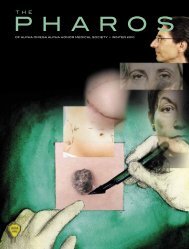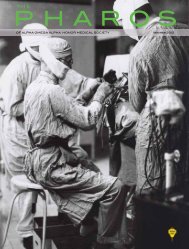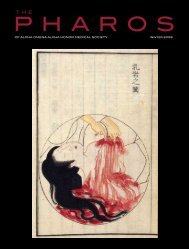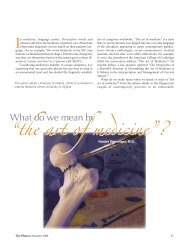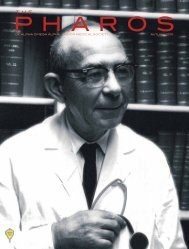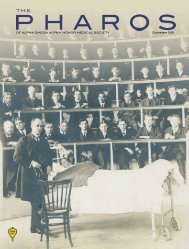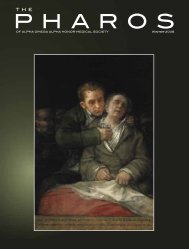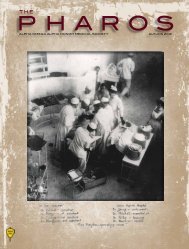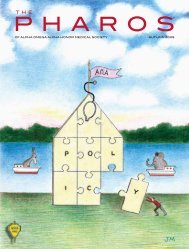4 - Alpha Omega Alpha
4 - Alpha Omega Alpha
4 - Alpha Omega Alpha
You also want an ePaper? Increase the reach of your titles
YUMPU automatically turns print PDFs into web optimized ePapers that Google loves.
Marat’s daily rants against the aristocracy earned<br />
him the disdain of the privileged and the adoration of<br />
the poor. “To pretend to please everyone is mad,” 2p734 he<br />
wrote. His allegiances to the Jacobins were well known.<br />
He hated the monarchy, and his rhetoric against the<br />
throne galvanized the rebellion.<br />
In the years following the storming of the Bastille<br />
in 1789, anarchy descended on Paris. With the deposition<br />
and capture of Louis XVI in 1792, the notion of a<br />
constitutional monarchy was quickly abandoned and the<br />
hope of a republic spread through Paris. During this unstable<br />
time, the balance of power shifted from the failed<br />
Legislative Assembly to the Paris Commune, a body composed<br />
not of politicians, but of the working class. Many of<br />
the delegates were members of France’s most unpredictable<br />
faction, the “sans- culottes.” The term meant “without<br />
culottes,” the knee breeches worn by the privileged. The<br />
Paris Commune wielded merciless authority and had no<br />
more vocal leader than Jean-Paul Marat.<br />
1792—Purge of<br />
counterrevolutionaries by the<br />
Paris Commune<br />
The revolutionary government survived an early threat<br />
in September 1792. With the Prussian army marching on<br />
Paris, and faced with insurrection at home by those loyal<br />
to the imprisoned king, the Commune sought to rid the<br />
city of any trace of “counterrevolution.” Thousands of<br />
the accused were arrested, imprisoned, and beheaded<br />
on charges of rebellion during the bloody September<br />
Massacres. Others were set free, only to be raped, castrated,<br />
or disemboweled at the hands of mob violence.<br />
Hearts were ripped from the chests of men and eaten.<br />
The head of Princesse de Lambelle, the maid of honor<br />
to Marie Antoinette, was placed on a pike and paraded<br />
beneath the temple fortress where the royal family was<br />
held captive. Blame for these atrocities rested with no<br />
single man, but reputation placed the crimes at the feet<br />
of Marat.<br />
Marat’s newpaper—its appeal<br />
to the poor commoners<br />
Marat’s influence began simply. In early September<br />
1789, he initiated publication of a newspaper that became<br />
Jacques Louis David (1748–1825): Jean Paul Marat, politician<br />
and publicist, dead in his bathtub, assassinated by Charlotte<br />
Corday in 1793. Oil on canvas, 165 x 128 cm.<br />
Location: Louvre, Paris, France. Photo credit: Erich Lessing/Art Resource, NY.<br />
his signature in Paris, L’Ami du Peuple. It was here,<br />
among the common soldiers of the French Revolution,<br />
that he finally found the acceptance he sought. The paper<br />
was controversial from its first issue, marrying philosophical<br />
and political doctrine with violence, suspicion,<br />
and conspiracy. Marat openly denounced France’s most<br />
prominent men as traitors based on presumption:<br />
In order to judge men, you always need proof positive,<br />
clear, and precise. For me, their inaction or their silence<br />
on great occasions is sufficient. In order to believe in<br />
a conspiracy, you demand judicial evidence; for me, it<br />
is enough to see the general course of events, the relationships<br />
between enemies of liberty, the comings and<br />
goings of certain agents of power. 6p158<br />
Not surprisingly, Marat found himself with few political<br />
allies. Attempts were made to weaken his influence by<br />
the circulation of false L’Amis with exaggerated diatribes<br />
and bloodthirsty language. Ironically, Marat attacked<br />
these spurious writings as being too tame to be his own.<br />
Cut off the thumbs of the aristocrats who conspire<br />
against you, split the tongues of the priests who have<br />
preached servitude.<br />
To secure the public tranquility two hundred thousand<br />
heads should be cut off. 5pxxii<br />
This rhetoric did not go unnoticed, and Marat fled to<br />
London. His subsequent return to Paris found four journals<br />
in circulation claiming to be his L’Ami. Undeterred,<br />
Marat wrote “I warn honest men not to play with the<br />
‘People’s Friend,’ any more, as he is never likely to be their<br />
dupe.” 7p26<br />
Marat’s blistering, pruritic,<br />
painful skin disease—what<br />
was it?<br />
I saw him at one time address himself to Louvet; and, in<br />
doing so, he attempted to lay his hand on Louvet’s shoulder,<br />
who instantly started back with looks of aversion,<br />
as one would do from the touch of a noxious reptile,<br />
exclaiming, “Ne me touchez pas!” (“Don’t touch me!”)<br />
—John Moore 8p389<br />
Marat’s journalism was a clandestine affair. Though<br />
he was well known throughout France, the location<br />
of his publishing house changed often and was kept<br />
secret from his political enemies. Several times he was<br />
forced to abandon his publication for fear of arrest. He<br />
19



